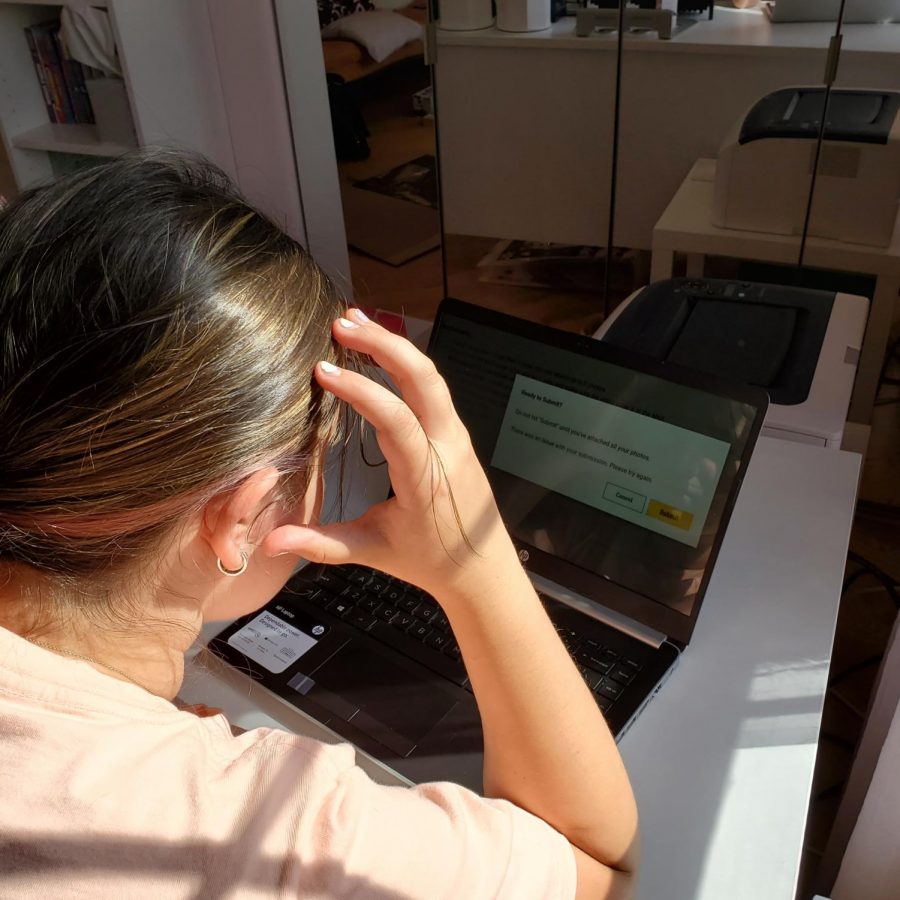The unlucky 2%
Technical difficulties kept some students from submitting their online AP exams
Photo by Sasha Kek
333,768 students world-wide could not submit their exams according to College Board data. Of the 1,302 exams that LZHS students took, about 36 could not be submitted due to technical issues.
The College Board offered online AP exams after schools were closed down due to the pandemic, however, some students experienced difficulties submitting their exams on test day.
One of these students was Abigail Harris, sophomore who took AP World History, who had trouble submitting her exam.
“[I was] extremely disappointed [when I could not submit my exam] because I’d worked so hard for weeks trying to practice and perfect my drafts,” Harris said. “I think [I was not able to submit] either because of the WiFi issue I had or the fact that I think the College Board just wasn’t prepared for the big cluster [of students taking the exam], so it was just too much coming into their server at once.”
The technical issues caused Harris to retake her exam in June, which she says was the same process for the initial exam, and “everything was well organized.” However, the ability to retake the exam did not improve Harris’s attitude about her experience.
“I thought I should just give them the benefit of the doubt because we’ve all kind of had to switch our schedules,” Harris said, “but I just feel like they kept saying that they were prepared, and then they weren’t.”
Students were not the only ones affected because of the various technical issues. Libby Reimann, Social Studies teacher, worked with the 10% of her students who had trouble submitting their first exams, which were on May 10 for AP World History and May 13 for AP European History.
“90% of my students were able to submit with no problem, now for that 10%, it was not good, but the College Board was also working from their homes,” Reimann said. “We think of them as this big monolithic organization, but Trevor Packer was doing webinars from his house, so they were under the same kind of crazy circumstances that everybody else was. They could have just canceled, but they didn’t.”
It was a good choice not to cancel exams, Reimann says, because “a lot of kids will get college credit because they carried through with the process,” Reimann said, although that isn’t the only beneficial outcome from the exam situation.
“I heard a lot of complaints from other teachers that kids just fell off the face of the Earth, and I did not have a single student fall off the face of the Earth,” Reimann said. “That says a lot for Lake Zurich and for being able to handle a difficult situation, which in the long run is more important than whether or not you learned European History. For being able to rise to the occasion in a difficult situation, it says a lot for peoples’ character which, as much as I like European History, it’s more important than your knowledge of European History.”
Not only have Reimann’s students shown adaptability, but their scores “were very close to the top, like statistically, insignificantly close,” Reimann said, in comparison to other years, which influences her opinion on the online exams the College Board prepared.
“By my students, I think the College Board did a good job [with the online exams],” Reimann said. “There are things I wish they did differently, but I think they pivoted and they came up with a product that allowed students to get to show their skills and their knowledge, and colleges agreed to take it for credit. In the end that’s the goal, right?”
As for next year’s exams, the College Board has announced that the 2021 exams will be “full-length, traditional AP exams covering the full scope of the course” so long as schools will be open in the spring.
“We are hopeful that all schools will be open in May 2021 as testing in-person best supports access and opportunity,” the College Board wrote. “We will also enable schools to divide their students across two May testing dates if social distancing is still necessary. And if safety concerns still prohibit schools from convening students for AP testing, we will provide a contingency plan by spring 2021.”

This is Sasha’s third and final year working with the Bear Facts staff as the LZ Life Editor. Aside from helping Bear Facts run smoothly, you can find...

